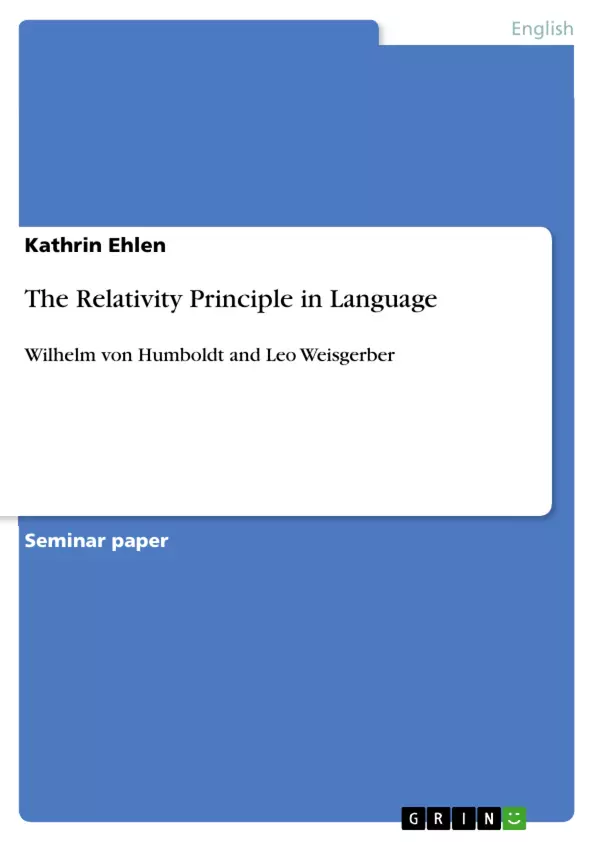For hundreds of years scholars have been pondering on the interconnection of language and thought with in some points corresponding and in some points differing results. Two important protagonists in this discussion were Wilhelm von Humboldt (1767-1835) and Leo Weisgerber (1899-1985), whose positions to this question I am trying to set out in this paper. As the theme is very complex, I shall at least attempt to point out some aspects, which seem especially important to me. All the authors I consulted agree that Humboldt’s theory cannot be comprehended without considering the philosophical background. Not being a student of philosophy, conceiving this part of the paper was very difficult for me. I tried to do my best by picking out those aspects of his philosophical ideas which I thought indispensable for the understanding of his doctrines.
Inhaltsverzeichnis (Table of Contents)
- Introduction
- Wilhelm von Humboldt
- Humboldt's Linguistic Relativity Theory
- The Purport of Language
- The Basis of Humboldt's Linguistic Doctrines
- The Process of Linguistic Determination
- The Influence of Variation among Languages on Thought
- Aspects Determining the Designation of Language
- Lexical Designation
- Grammatical Designation
- Leo Weisgerber
- The Relation of Language to Cognition
- The Law of the Sign and the Law of the Field
- The Theory of Grammar and the "Weltbild"
- The Word Classes
- The Sentence
- The Capacity of Languages to Organize Thought
- Conclusion
Zielsetzung und Themenschwerpunkte (Objectives and Key Themes)
This paper examines the theories of Wilhelm von Humboldt (1767-1835) and Leo Weisgerber (1899-1985) on the relationship between language and thought. It aims to present their positions on this complex topic and highlights key aspects that seem particularly important. The paper acknowledges the strong connection between Humboldt's linguistic theory and his philosophical background.
- The relationship between language and thought
- Humboldt's linguistic relativity theory
- The role of language in shaping thought and cognitive processes
- The influence of language on world perspectives
- Weisgerber's concept of the "Weltbild" and its relation to grammar and language
Zusammenfassung der Kapitel (Chapter Summaries)
The introduction sets the context for the discussion by outlining the long-standing debate on the interconnection of language and thought. The paper highlights the importance of understanding Humboldt's philosophical background to comprehend his linguistic theory.
Chapter 2 focuses on Wilhelm von Humboldt and his linguistic relativity theory. It explores the concept of language as a product and process, emphasizing the latter's significance. The chapter analyzes Humboldt's view of language as a creative act of the mind, highlighting its influence on cognitive processes. It examines the role of words in shaping concepts and the implications for individual world perspectives.
Chapter 3 delves into Leo Weisgerber's theory, examining his views on the relation of language to cognition. It explores Weisgerber's concepts of the "Law of the Sign" and the "Law of the Field," and their influence on the "Weltbild" – the world-view embedded in a language. The chapter discusses Weisgerber's theory of grammar and its impact on the organization of thought.
Schlüsselwörter (Keywords)
The main keywords and focus topics of this paper include: linguistic relativity, language and thought, cognitive processes, world perspectives, Weltbild, grammar, word classes, sentence structure, linguistic determination.
Frequently Asked Questions
What is Humboldt's Linguistic Relativity Theory?
It suggests that the structure of a language influences the thought processes and world-view of its speakers.
How did Leo Weisgerber expand on Humboldt's ideas?
Weisgerber developed the concept of the "Weltbild" (world-view) embedded in language and introduced the "Law of the Field."
Is language a product or a process according to Humboldt?
Humboldt viewed language primarily as a creative process (energeia) of the mind rather than just a finished product (ergon).
What is the "Weltbild" in linguistics?
It refers to the specific way a language organizes and interprets reality, shaping how its speakers perceive the world.
Does language determine thought?
The paper explores linguistic determination, arguing that while language shapes thought, it is also a tool for the mind's creative expression.
- Quote paper
- Kathrin Ehlen (Author), 2006, The Relativity Principle in Language, Munich, GRIN Verlag, https://www.grin.com/document/173791



